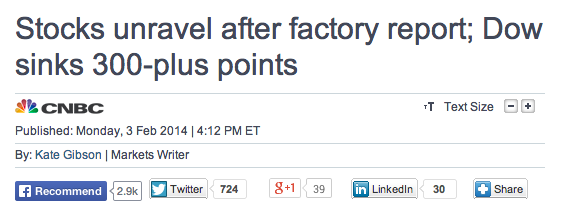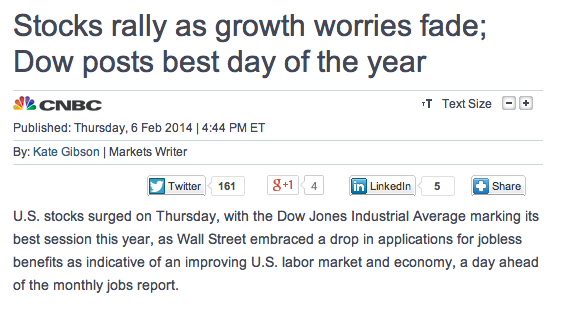What, you want some sort of fresh take? It’s personal finance, where there’s very little new under the sun. The basics are straightforward, not that that stops tens of millions of people from ignoring them. Buy assets. Sell liabilities. Look at the full price of something rather than its apparent price (your $100,000 house is really a $215,000 house). Don’t incur debt for stupid reasons. Don’t buy unreasonable stuff. (Not unrationalizable stuff, unreasonable stuff.) If you think furthering your education is important, paying tens of thousands of dollars for a useless English degree is not the way to do it. (It’ll educate you alright, but not in the way you planned.)
One more: Don’t pay attention to short-term market movements or other economic indicators. In fact, when the time period is short enough, calling them “economic indicators” isn’t even accurate. Here’s what we mean:
Monday’s CNBC headline, which also warranted the big font on Drudge Report:
And, yesterday’s CNBC headline:
How do these journalists live with themselves? (Rhetorical question: They’re journalists. Unlike dogs, they don’t have souls.) Kate Gibson’s Monday piece is full of doom and foreboding, with lines such as “heightening concern about the economy” and “investors compiled a list of worries”. How come reporters editorialize when they shouldn’t, and refuse to when they should? Gibson ought to have added, “The market’s going to bounce back by the end of the week. It always does. And if stocks had risen 300 points today, I’d be making the opposite pronouncement about what’ll happen by Friday.”
Again, this is how the game works. You can fill in the template and make your own financial story:
- Overblown headline
- Quote from strategist at a reputable firm
- Appended quote, if you’re running short
- Quote from another source to show that you’re objective
- Meaningless data
Done!
Here’s the quote from the 1st strategist in the 2nd story: “What we’ve seen over the last week or so is the market looking for direction.” No, what we’ve seen is ordinary, unremarkable fluctuation. But an analyst who would say that is never going to see herself quoted on CNBC, or anywhere else. Being a major journalist’s go-to quote machine gets one recognition, which can be expected to lead to personal wealth. For the source, not for anyone else. “Nothing to report” is not a report, even though, paradoxically, it often should be.
We’ll save the authority-bashing for a later paragraph. The takeaway from this is that daily movements in the markets are meaningless. Utterly, completely meaningless. They shouldn’t even be reported on, but what are you going to do? CNBC has an electric bill to pay and a schedule to fill, as do Fox Business, Bloomberg and related nonsense. The markets are open every weekday, and thus their levels will either rise or fall relative to the previous day, so technically, if you’re a news editor, you have a guaranteed story every day. As we pointed out years ago, neither a good day nor a bad day in the markets means anything. Nor a good week or a bad week, for that matter; at least not for the market at a whole. An individual non-penny stock can decline irreversibly in one day, not that it happens that often. (It never works in the other direction. No stock goes from middling to breakout blue-chip that quickly, for the same reason that demolishing a building takes less time than constructing it does.)
We beseech you to unlearn. To step away from the data, before you drown in it. You know how continued exposure to Facebook or 99% of what’s on Twitter makes you stupider? Same thing here. Look, every part of your daily news feed is bloated and full of empty calories, not just the financial stuff. “New Study Shows Link to Overeating, Obesity”, “Obama Endorses Democrat in Senate Race”, “Water Wet” etc. Unplug and understand that you’re in this for the duration. That doesn’t mean you have to defer every piece of gratification to the last possible moment; far from it. It means you need to see the forest for the trees.
Buy undervalued assets. Do your research well in advance, before committing, and understand that even a healthy investment with plenty of growth potential isn’t going to augment in value overnight. Or overweek. Or even overmonth. Don’t know where to start? Good: here’s an obtrusive commercial, right in the middle of the narrative.
The financial news is entertainment, and very little more than that. Moreover, it’s not even good entertainment. The only story of any consequence this week is that Microsoft hired a new CEO, and that Bill Gates is sort-of coming back. Unless you’re in the industry, the guy at Steven Cohen’s SAC Capital who got busted for insider trading is of zero consequence. Boston Federal Reserve Bank president says what his boss orders him to? Don’t waste your time. Just understand the difference between what’s important and what’s trivial. If in doubt, go with trivial.




